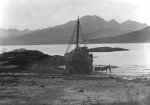Over the Sea to Skye : Moffat Aboard a Puffer (Excerpt from Moffat III)


By Ewan
- 1573 reads
Whatever the scenic joys of the Highland Railway, in particular after changing trains at Dingwall on the way to “The Kyle”, as all of the railwaymen from conductor to Station-master called it, I appreciated precious few of them. I slept from Inverness to Dingwall. From there to our destination, my only memory was of interminable bridges and cuttings through some of the bleakest landscapes I have ever seen. I did feel the old bottle-ache somewhat strong through most of it.
If I had hoped that our mid-afternoon-dusk arrival at the station in “The Kyle” signified the reaching of our destination, I was very sadly mistaken. Waiting at no distance at all from the railway station, moored alongside a ramshackle jetty, was quite the least prepossessing vessel I’d seen since travelling on “The Enterprise” along the Mississippi, more than three decades ago. We were to be carried over the sea to Skye on a rusting puffer with the name “Mo Làmh-sa Bonnie” inscribed in Gaelic on the prow and stern, which were at no great distance from each other. Nevertheless, there were already a half-dozen passengers and a crew of four aboard, including the master of the vessel. This stout and short toby-jug of a man had to make himself heard through a thicket of mustachios that gave him the look of a walrus.
‘Cum oan, hwull ye hurry yoower-selves, aye ham noat fer missing the tide foar the sake of fower passengerss, or my name eess noat Wullie Nicolson.’
This barely comprehensible encouragement to board came from the shortish fellow with a gleam in his eye and a miasma of alcoholic fumes surrounding his person. This last must have been extremely strong to have penetrated my own.
As we cast off, and the engine began to knock and rattle, the others took their place below decks in what was laughably termed the stateroom by Captain Nicolson. I stayed above, fearing the confined space and rolling of the boat would bring on a calamitous bout of vomiting. I looked back to shore. A man in nautical attire somewhat smarter than Nicolson’s was leaping up and down on the jetty. Most likely it was the harbourmaster, and I presumed he was showing his displeasure at Nicolson’s enterprise in providing a ferry outwith the officially sanctioned service.
Nicolson kept one hand on the wheel and turned towards me. His complexion was not so much weatherbeaten as thrashed. His eyes seemed slitted as though against a wind he expected any moment to blow still stronger. They watered constantly. No sadness, however deeply felt, could ever have been the cause of such lachrymal effusions. He spoke again, his islander’s accent as peculiar as his garb.
‘Hwell, ye’ll be needin’ a drink?’ He produced a small flask and I partook of the water-of-life, although it tasted deathly bad. The man seemed in need of conversation, or at least an audience, for he continued, ‘Fer hwit are ye going tae the island? Ye’re nae Highlander, ye might be one of they sassenach-educated fools that return tae some estate and ruin it. Aye, ye chust might.’
Hoping to disarm him with my honesty, I replied that I had no idea at all. Nicolson replied, in his turn,
‘Aye well, ye can just liss-ten hwile I talk and tek a dram fower yerself, now and then.’
I confess, I found the music in his chatter quaint and the hardening of every soft consonant gave the impression that some pinniped had acquired the power of speech, ‘ass iff py machick’ as the old sailor himself might have said. He did offer something of interest,
‘I peeked upp a fell-ow chust last week. A sta-rainch mon, he wass. About ass talkatiff ass yowerself, in fa-act.’ I held out my hand and he placed the flask in it again.
‘Hwell now, hwat wass mosst peckeyuliar, wass the fact the man did not sleep at-tall. We made a night crossing. That auld fool, the Harbour-master wass no doubt at the Widow MacDonald’s house conducting some intee-mate buss-i-ness. No, thiss man, he had a name ass sta-rainch ass hiss own self. Hwit wass it, now? Gordo? Nodrog. Uwerdog, that wass him.’
Recognising that Nicolson was speaking of Ördog, I asked him what he had found so “star-ainch” about him.
‘Hwull, fower wan thing, he kept a-luking fower the moon. It wass a clou-dy night, and so Madame Luna peeped out from be-hind her cur-tainss but rayer-ly. Tek the hweel, Muster…’
‘Moffat.’
‘Aye, hwell, at least ye’re a Scot.’
*****************************************************************************************
[Well done, for getting this far. You can hear me reading this badly here.]
- Log in to post comments
Comments
Great to be back in Moffat
Great to be back in Moffat land! Brilliant accent on the reading (well, I thought so) ![]()
- Log in to post comments
:)
"His complexion was not so much weatherbeaten as thrashed. "
Pure Moffat :)
best as ever
L x
- Log in to post comments
unfortunately the sassenach
unfortunately the sassenach fools run not only the estate(s) but the country. I'd love Moffat to deal with the Johnson cabal.
- Log in to post comments


